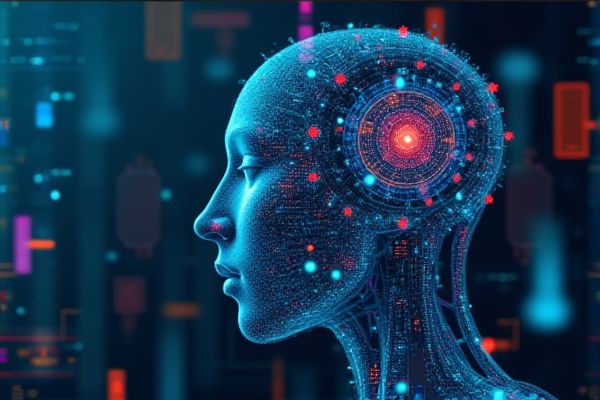
AI streamlines software development by automating repetitive tasks, thus enhancing productivity and allowing developers to focus on innovation. Machine learning algorithms analyze vast datasets to identify coding patterns, improving bug detection and offering predictive insights for project timelines. Natural language processing tools facilitate communication by converting user requirements into code snippets, bridging the gap between technical and non-technical stakeholders. AI-driven testing tools also enhance software quality by executing automated tests and providing real-time feedback, ensuring more robust and reliable applications.
AI usage in software development
Automated Code Generation
Automated code generation in software development can enhance productivity by reducing the time developers spend on writing repetitive code. Tools like GitHub Copilot illustrate this potential, allowing developers to generate code snippets based on context. The likelihood of minimizing human error increases as AI tools assist in ensuring code consistency and adherence to best practices. This approach may lead to a more efficient development cycle, facilitating quicker deployment of high-quality software solutions.
Intelligent Testing and QA
AI in software development can streamline the testing process through predictive analytics and automated test case generation. Intelligent Testing tools, such as Test.ai, enhance the accuracy and efficiency of identifying bugs, reducing the time needed for quality assurance. By leveraging machine learning, teams can analyze user behavior data to prioritize testing efforts based on likelihood of issues. This approach increases the chances of delivering higher quality software while minimizing manual effort.
Bug Detection and Fixing
AI can significantly improve software development by enhancing bug detection and fixing processes. Tools like GitHub Copilot leverage machine learning to identify code flaws early, reducing debugging time. The integration of AI algorithms allows for predictive analysis, helping developers anticipate and address potential issues before they escalate. This not only speeds up the development cycle but also increases overall software quality.
Natural Language Processing for Documentation
AI in software development, particularly through Natural Language Processing (NLP), offers the potential to streamline documentation processes. For example, tools like OpenAI's Codex can automatically generate code comments and documentation from existing codebases. This can reduce the time developers spend on manual documentation and improve code clarity. Enhanced documentation accessibility may also lead to better onboarding experiences for new team members at institutions like tech startups.
Code Refactoring and Optimization
AI can improve software development processes by enhancing code refactoring and optimization. For instance, tools like GitHub Copilot offer intelligent suggestions that streamline coding and reduce the potential for errors. By analyzing existing codebases, AI algorithms can identify inefficiencies and recommend improvements, which might result in better performance. This capability presents a significant advantage for software engineers at institutions like Stanford University, where cutting-edge research on AI in programming is conducted.
Predictive Analytics for Project Management
AI usage in software development can enhance coding efficiency by automating repetitive tasks and identifying bugs early. Predictive analytics for project management allows teams to forecast potential risks and optimize resource allocation effectively. For example, tools like Jira incorporate predictive features, enabling managers to make informed decisions based on historical project data. These advancements suggest that organizations adopting AI technologies may gain a competitive edge in delivering high-quality software on time.
AI-driven DevOps and CI/CD
The integration of AI in software development can streamline processes and enhance efficiency. AI-driven DevOps can potentially automate routine tasks, allowing teams to focus on more complex problems. For example, using AI in CI/CD pipelines can reduce deployment times and improve code quality. This possibility of enhanced productivity presents a significant advantage for tech companies aiming to stay competitive.
Machine Learning for Performance Tuning
AI can greatly enhance software development by automating code generation and identifying bugs. Machine learning algorithms can optimize application performance by analyzing usage patterns and adjusting resources dynamically. For instance, a tech company could implement these techniques to reduce latency in their web services. The possibilities for improving efficiency and reducing costs are substantial in the field of software engineering.
Algorithm Selection and Optimization
AI tools can enhance software development by streamlining algorithm selection and optimization processes. For instance, machine learning models can analyze vast datasets to predict the most effective algorithms for specific tasks, improving efficiency. This can lead to reduced development time and better performance of applications. Companies like Google are exploring AI to automate code generation, potentially increasing the chance of achieving superior software solutions.
AI-assisted User Interface Design
AI in software development can enhance efficiency by automating repetitive tasks, allowing developers to focus on more complex functions. AI-assisted user interface design, for example, can optimize user experience by analyzing user interactions and suggesting improvements. This technology provides the possibility of creating more intuitive designs tailored to specific user needs. Such advancements may lead to increased user satisfaction and retention for businesses like Microsoft or Adobe.
 techknowy.com
techknowy.com